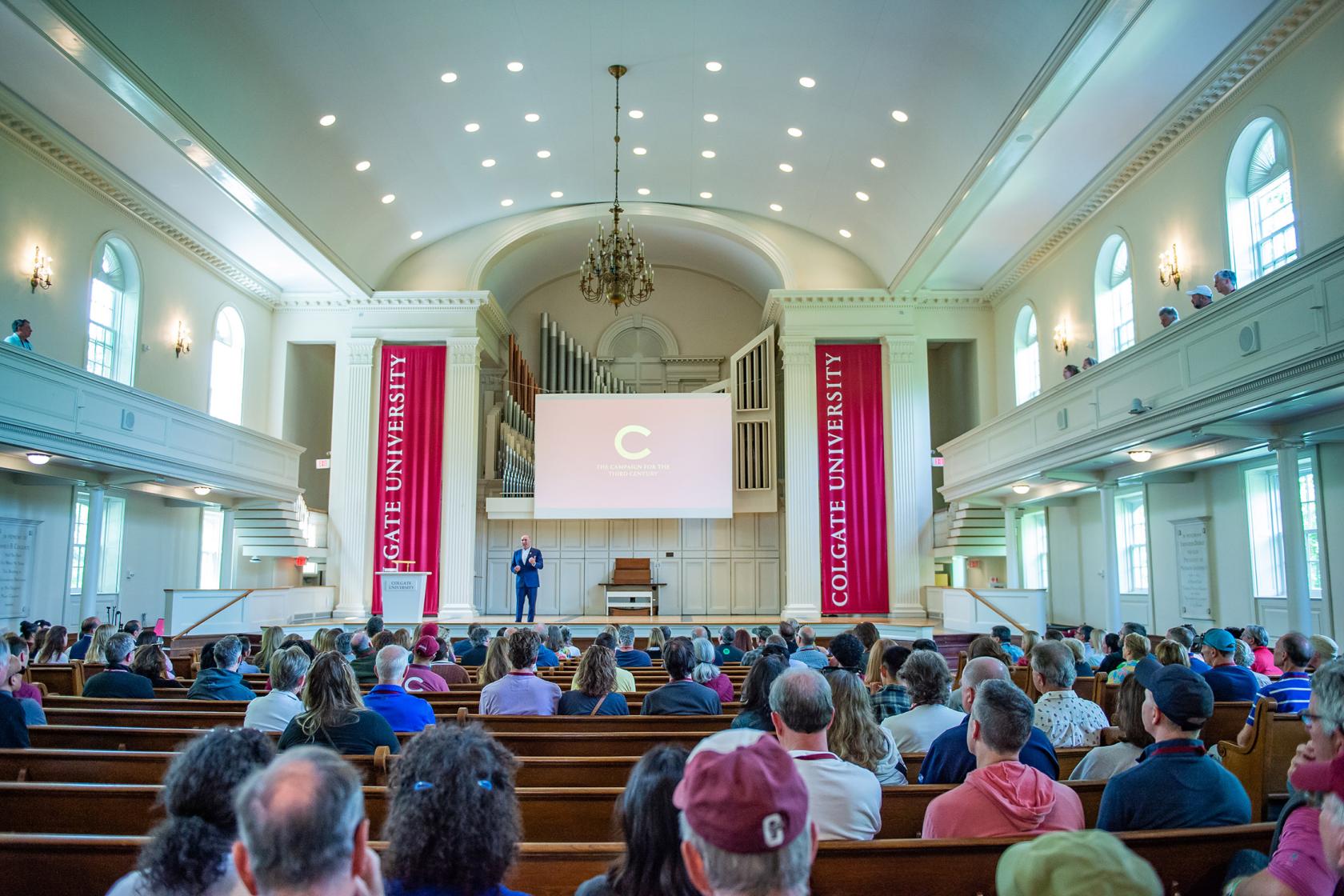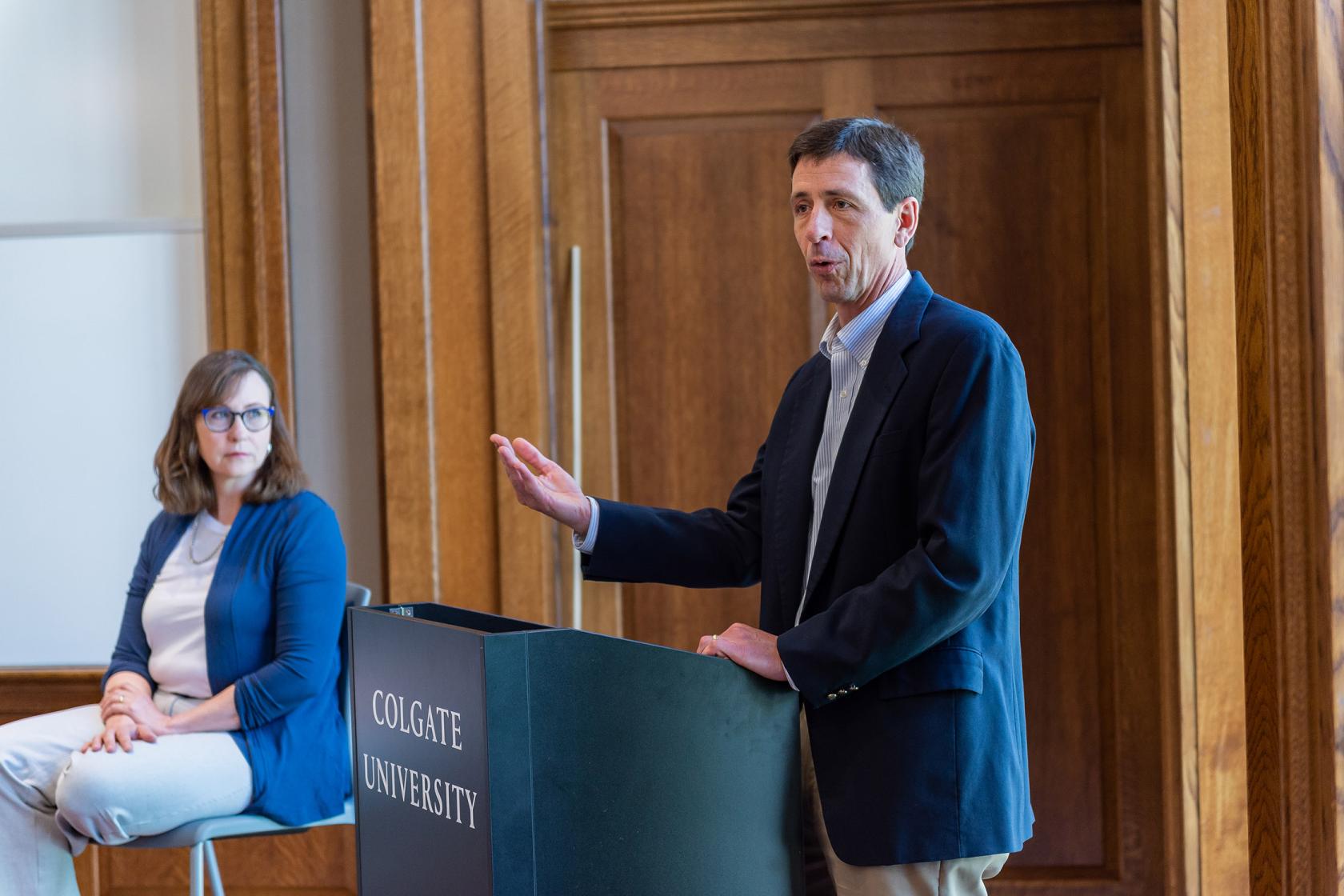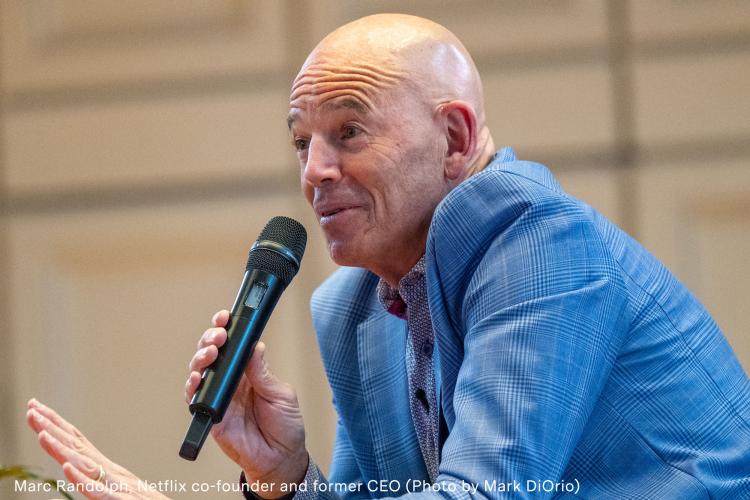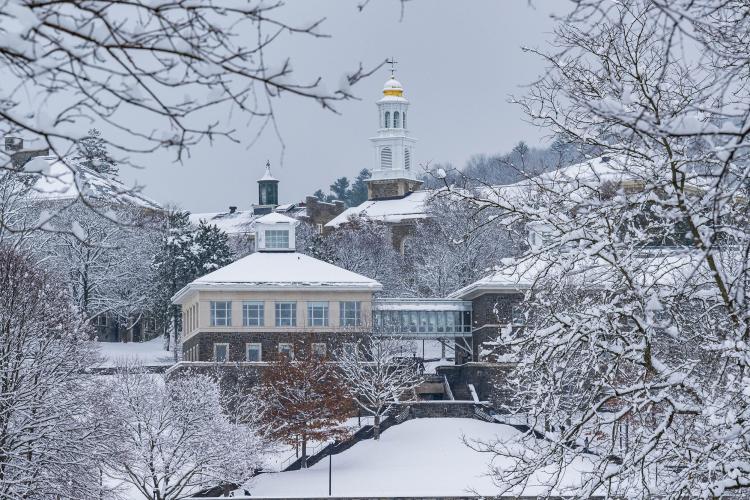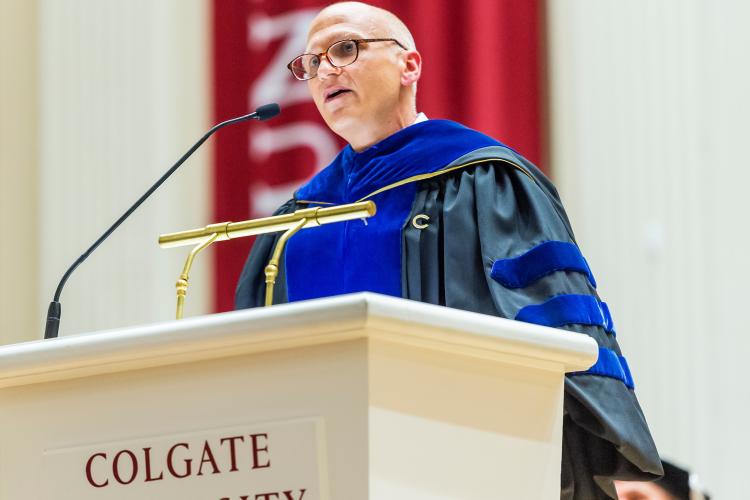Attracting the Best and Brightest
The highest honor awarded to faculty members, endowed chairs provide dedicated funds to enhance research and teaching efforts and additional time for high-level scholarship. Russell Colgate Distinguished University Professor of Biology Ken Belanger moderated as a panel of current chairholders gave alumni insight into their current projects, which include research into personality development and behavioral disorders in young adults; studies involving organic synthesis in chemistry; the impact of immigration policies on the American economy; and editing of letters from English poet and scholar John Donne.
They also discussed Colgate’s need for 25 Third-Century Endowed Chairs.
“By providing more endowed opportunities for additional faculty, we can enhance the teaching that goes on for our students,” said Belanger. “We can also enhance the scholarship that takes place and improve the recruitment and retention of faculty in the long term.”
Innovating With Intention
Lesleigh Cushing, incoming dean and provost of the faculty, moderated a panel on the Middle Campus Initiative in Arts, Creativity, and Innovation.
This fall, Colgate will break ground on the Benton Center for Arts, Creativity, and Technology, which will serve as one of the centerpieces of the University’s plans to form a hub of arts, creativity, and innovation in a newly-formed Middle Campus.
Alumni also learned of future plans that call for a new Performing and Visual Arts Center to house Colgate’s theater and dance programs; renovations to James C. Colgate Hall to house the music department and serve as an events hub and recital space; a new Picker Pavilion and interconnected facilities for university museums and collections; and renovations to the Dana Arts Center and the Brehmer Theater. A terrace adjacent to the Benton Center will provide additional spaces for faculty and staff to gather and collaborate.
The Ravine, a landscaped walkway descending from the top of the hill near Frank Dining Hall, will seamlessly connect Middle Campus to Upper Campus and the academic quad, giving the space intentionality — a second academic quadrangle.
“The arts are increasingly interdisciplinary,” Cushing said. “By animating this area of campus, we will radically alter the student experience, better infuse and integrate the arts into the curriculum, and attract faculty and staff of the highest caliber.”
Both, And
It’s not one or the other — athletics or academics — it’s the best of both.
Renovations on Reid Athletic Center were among the priority initiatives shared by Vice President for Athletics Nicki Moore and her coaching staff.
“Colgate is about excellence, and it’s what we strive for in athletics,” said men’s basketball head coach Matt Langel. “This new facility speaks to the institutional and alumni support our student-athletes have and our collective desire to build a home for them that they can take pride in and will enhance their experience.”
In addition to capital improvements, Moore also touched on Colgate’s plans to recruit and support student-athletes and its athletic programs through increased scholarships and need-based financial aid.
Ho MBBI at the Nexus
Led by biology professor Krista Ingram, faculty participated in a panel discussion that walked alumni through plans for the new Robert Hung Ngai Ho Mind, Brain, and Behavior Center and the renovation and expansion of Olin Hall.
Faculty shared research and projects funded in the initial year of MBBI, including the efficacy of teaching Japanese speech sounds with visual representations; an opioid pandemic symposium; a theater performance, informed by brain sciences scholars and library faculty, exploring neurodiversity; and a collaboration between physical education and biology faculty to study the relationship between gut microbiomes and concussions.
“More than ever in our history, discovery requires reaching across disciplines,” said Ingram. “MBBI will create a research nexus in the physical form while also allowing investigators with specific expertise to work, interact, and serve as an intellectual bridge to academic disciplines across campus that have interest and connections related to mind, brain, and behavior.”
Diversity, Equity, and Inclusion
Vice President for Equity and Inclusion Renee Madison, appointed in October 2021 as part of the Plan for Diversity, Equity, and Inclusion, outlined four areas of focus in Colgate’s third century: the student experience; faculty and staff diversification, equity, and belonging; community culture; and evaluating current policies, practices, and structures.
She was joined by an alumni panel that engaged in a lively discussion, reflecting on DEI efforts in Colgate’s past, present, and future.
“It’s important to have these types of conversations that look in the mirror at who we’ve been and how we want to value diversity, equity, and inclusion moving forward,” said Madison. “We are looking to intentionally create a community where we are thinking about, living, and modeling the values we espouse.”
Unwavering Commitment
In an hour-long discussion at Case-Geyer Library, Jones and Wood Family Vice President for Admission and Financial Aid Gary Ross and Dean of Admission Tara Bubble illustrated the importance and impact of the Colgate Commitment, which removes federal loans from nearly all students, eliminates tuition for those coming from families earning less than $85,000 per year, and caps tuition for families earning less than $150,000.
Preliminary analysis indicates that students in that income range are choosing Colgate at an increased rate since the launch of the commitment.
Furthermore, Colgate received a record 21,261 applications for the Class of 2026, representing a 147% increase over the last three application cycles. The rise in applications has corresponded with an increase in the diversity and quality of the applicant pool.
“We are going to continue to admit the best and brightest students,” said Bubble. “But the resources, earning power, and potential of individual students and their families to afford a Colgate education is less than it was 50 years ago. It’s our responsibility to fill that gap and we believe in 100% need-based financial aid to support the students we admit.”
